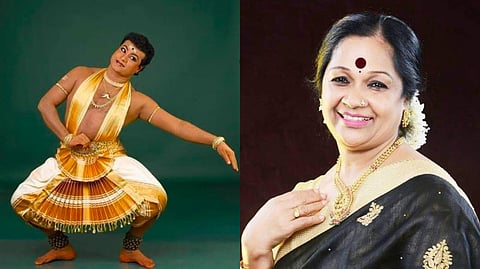

Classical dancer Kalamandalam Sathyabhama is in the eye of a raging controversy in Kerala after making several discriminatory remarks, believed to be covertly directed at Mohiniyattam artist RLV Ramakrishnan, brother of the late Malayalam actor Kalabhavan Mani. Sathyabhama also used colourist adjectives to describe male dancers, stating that only “fair-skinned, good-looking men” are eligible to perform Mohiniyattam. She made these statements in an interview on a YouTube channel, the footage of which went viral and soon triggered a row.
In the interview, Sathyabhama said it is “disgusting” to watch male dancers perform Mohiniyattam. “Only exceptionally handsome men look good while performing Mohiniyattam which is meant for mohinis (women). Some of the performers' complexions are dark as a crow, and even their own mothers would not want to look at them,” she said, launching a vile attack on the bodies of male dancers.
RLV Ramakrishnan responded to the interview with a Facebook post on March 20 stating that it is difficult for a person like him, who comes from a Scheduled Caste, to continue in the profession due to the attitudes of seniors like Sathyabhama. Though Sathyabhama did not explicitly take his name in the interview, he alleged that her remarks were directed at him. He said that she had verbally abused him earlier also, when he was doing his doctorate at the Kerala Kalamandalam dance school. Ramakrishnan clarified that he would pursue the matter legally.
Sathyabhama’s statements have irked many, including Kerala’s Higher Education Minister R Bindu and Education Minister Sivankutty, who criticised her for normalising casteist ideals even in today’s progressive world.
Renowned Mohiniyattam dancer Jolly Mathew, who was the first male dancer to get the Union government fellowship for Mohiniyattam, told TNM that discrimination in the arts based on caste, gender, or colour is unacceptable and intolerable. “I got the fellowship in 2003. Twenty years ago, the government gave me the fellowship knowing that I am a male Mohiniyattam dancer. What I don’t understand is the absurdity of saying that men should not perform Mohiniyattam at a time when men learn Mohiniyattam, become teachers, and even get empanelled as judges in the arts festivals,” he added.
Following the criticism, Sathyabhama doubled down on her claims to the media, asserting that she said nothing wrong. “I expressed my personal opinion. I didn’t mention any caste or religion. I also didn’t mention anyone’s name. The name of the dance form is ‘Mohiniyattam’ so a Mohini (an attractive female) should do that. People have different opinions. If an artist thinks a black-skinned person can perform Mohiniyattam, it is their opinion. But for me, the performer should be fair-skinned,” she said.
She also claimed that one of the factors that comes up while judging a Mohiniyattam performance is the performer's appearance. “While we judge a Mohiniyattam performance in University youth festivals, there is a column in the judging note for the performer’s beauty. Why is that column there? That means the performer should have some beauty,” she added. She also asked the reporters to read ‘Natyasastra’, the foundational text for classical dance forms, and learn about the attributes of a good dancer.
When journalists asked her whether the text equates a good dancer to someone with fair skin, she responded rudely, reiterating that “beauty of the body” is important in dance.
Jolly Mathew vehemently rejected Sathyabhama’s claims and told TNM that appearance doesn't mean skin tone, and that beauty is not equivalent to fair skin. “I have judged many art festivals and believe that the performer's appearance in Mohiniyattam should be evaluated based on the formatting of their clothes, accessories, makeup, and hairstyle, not their skin colour or body shape,” he said.
Professor Raja Lakshmi, principal of RLV College, also told the media that caste or religion has nothing to do with learning or teaching an art form. “Ramakrishnan was our student, and Sathyabhama’s statements are an insult to our college as well as the teachers who were there [when Ramakrishnan was a student]. Ramakrishnan is a brilliant artist, and I doubt whether she has the wisdom needed to understand his art,” she said.
Mohiniyattam dancer and academician Methil Devika also responded to the controversy, expressing solidarity with Ramakrishnan. She called Sathyabhama’s statements unacceptable and discriminatory.
In a press release, the Kerala Kalamandalam too condemned Sathyabhama’s remarks, calling it “a disgrace for the institution to associate with a person who makes such derogatory statements.” “She has no connection with the Kalamandalam at present apart from being an alumnus of the institution,” read Kalamandalam’s statement.
It is to be noted here that the Sathyabhama in question must not be confused with her namesake the late Kalamandalam Sathyabhama, a veteran performer who revolutionised the Mohiniyattam curriculum at Kalamandalam, which eventually led to the evolution of what is called the ‘Kalamandalam style of Mohiniyattam’. Kalamandalam Sathyabhama, who passed away in 2015, was awarded the Padma Shri for her contribution to art and culture in 2014.
Discourse about casteism and colourism in the classical dance world had also come up strongly during the recent #MeToo movement that broke out in Chennai’s Kalakshetra Foundation. Students had alleged that the institution was systematically casteist, allowing body shaming and moral policing to thrive and enable abusers.